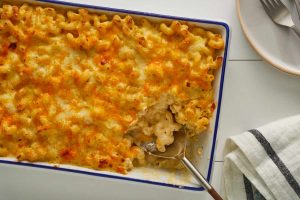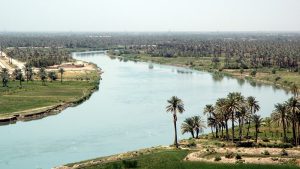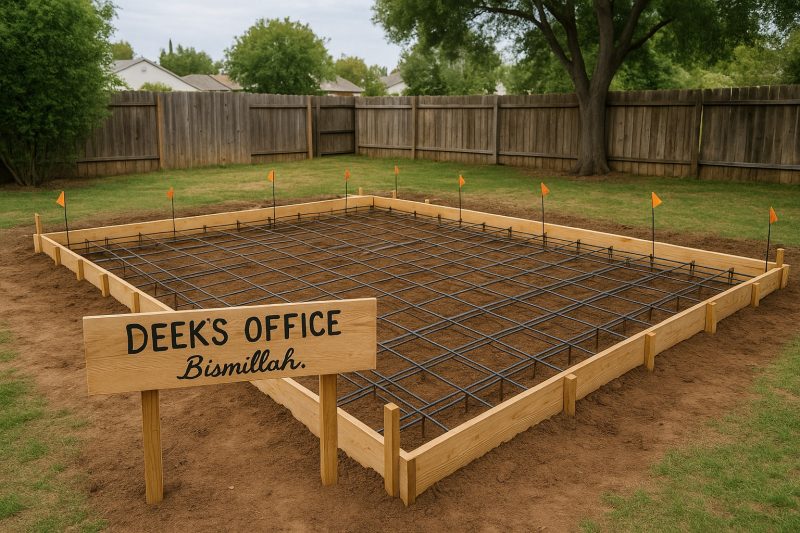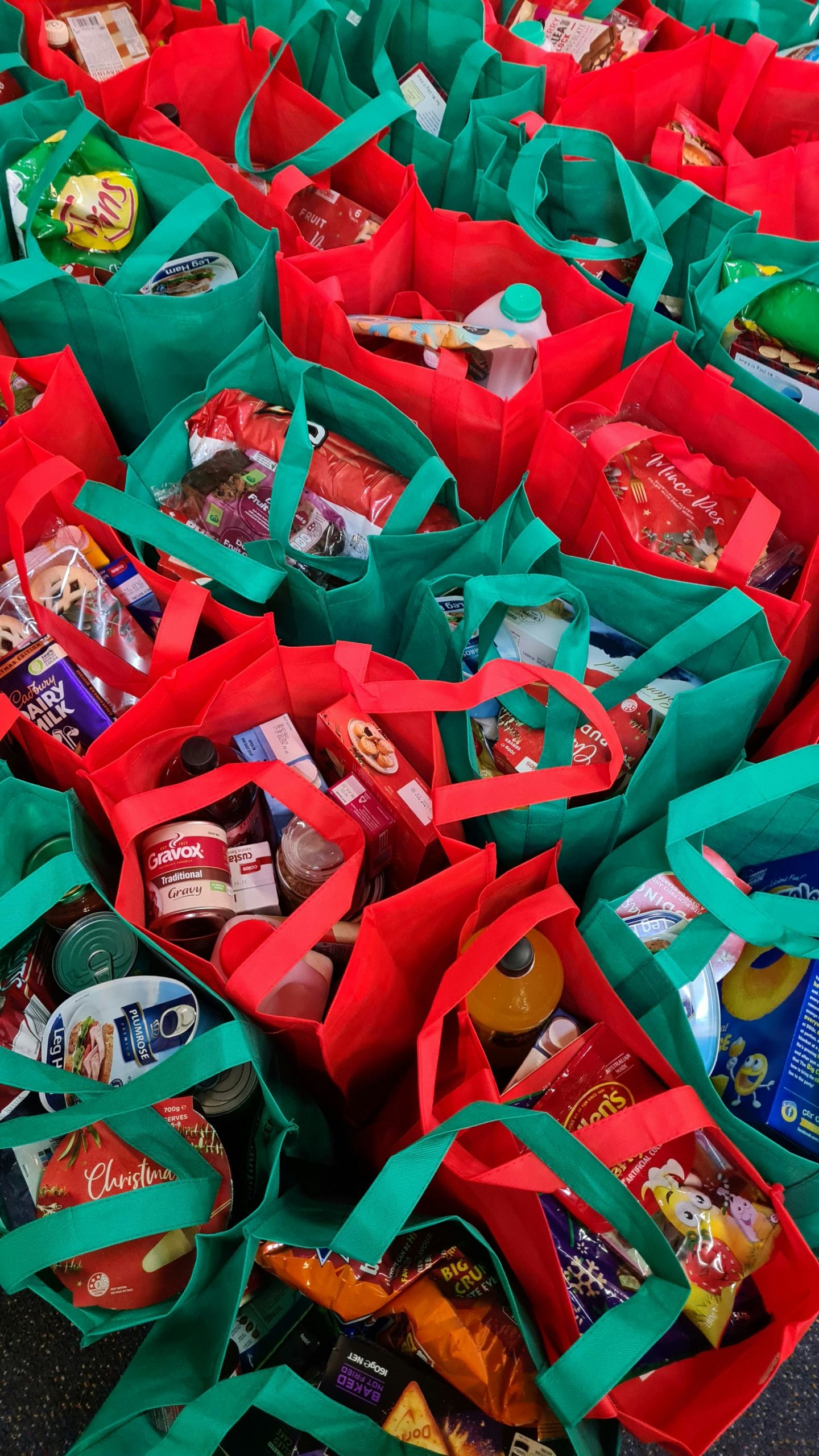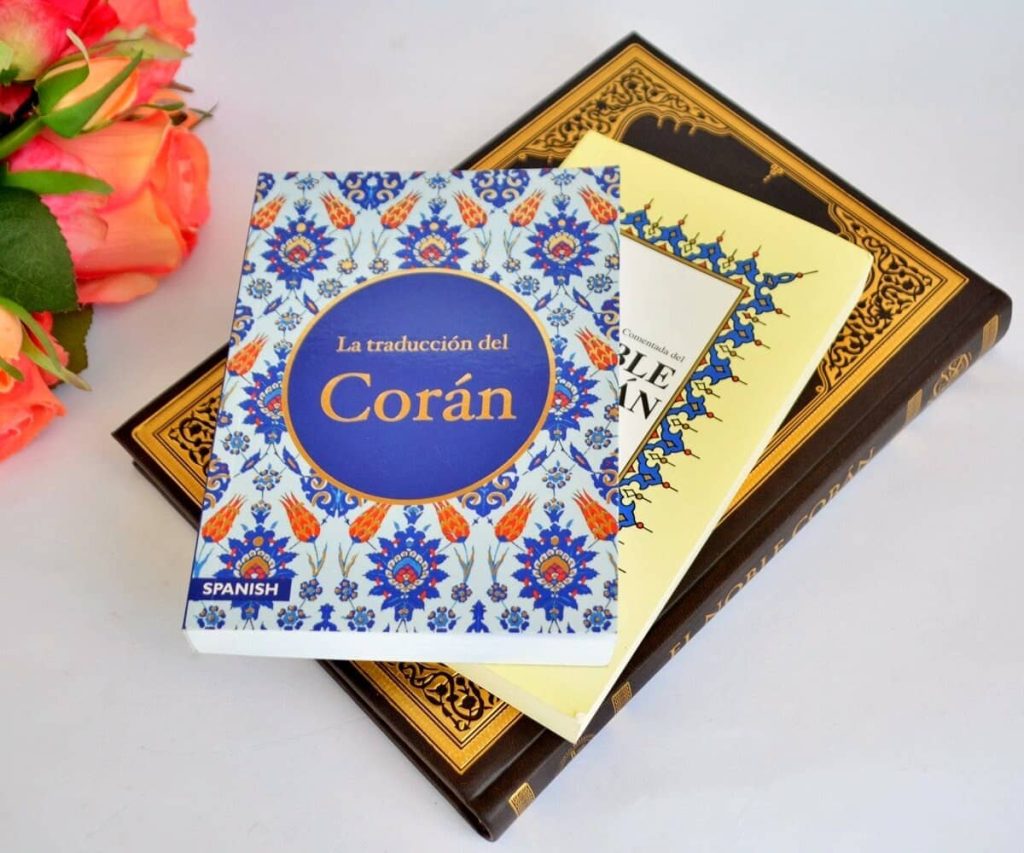Deek shows his family the Saghir Building, reveals a great surprise for Faraz, and confronts his own mission during a heartfelt picnic.
Previous Chapters: Part 1 | Part 2 | Part 3 | Part 4 | Part 5 | Part 6 | Part 7 | Part 8 | Part 9 | Part 10 | Part 11 | Part 12 | Part 13| Part 14 | Part 15 | Part 16 | Part 17 | Part 18 | Part 19 | Part 20 | Part 21 | Part 22 | Part 23 | Part 24 | Part 25 | Part 26 | Part 27 | Part 28| Part 29 | Part 30 | Part 31
* * *
“Every being on earth is bound to perish. Only your Lord Himself, full of Majesty and Honor, will remain.”
– Surat Ar-Rahman, 26-27
A New World
The next morning Deek woke up newly born, as if he’d fallen through the black depths of the river, passed through an underground tunnel, and risen into a new world where the sun shone, he was loved, and miracles happened every day.
Of course, he realized, that was how the world had always been. He simply hadn’t appreciated it as he did now.
He was still weak from his near-death experience, and at moments felt like his legs might not hold him up. But he was back with his family. Sunlight the color of egg yolks streamed in through the windows, bathing his skin and warming him, as if to remind him that there was more than one kind of natural flow, and that life went on. Looking out of the window, he saw Marco’s incredible sculpture hovering in the front yard like a sign of unimaginable things to come.

Bagila bil-Dihin
Rania and the girls were still asleep. Deek padded into the kitchen in his pajamas and slippers, and started pulling ingredients out of the pantry and fridge. A half hour later he’d prepared bagila bil-dihin, a slightly heavy Iraqi breakfast dish consisting of fried eggs over broad beans and soaked pita bread, topped with hot oil. Alongside it, he prepared thin-sliced Hollandaise cheese, black olives, a few sweet pastries he’d found in the fridge and warmed up, and fresh dates.
The girls trickled out, awakened by the smell of the food, and helped him set the table, and Rania came out last, rubbing her eyes.
“MashaAllah ya Deek,” Rania said. “You made breakfast for a queen.”
“And you are that queen?”
“Obviously.”
“How do you know it was me?” Deek said. “It might have been the girls.”
“Sanaya would have made a vegetarian omelette, and Amira would have heated up a frozen bean burrito.”
“Whatever Mom,” Amira objected. “It’s not my fault nobody taught me to cook.”
“I could never tear you away from the video games long enough to learn.”
Ah yes, Deek thought. I’m definitely home again.
As they ate, Rania kept reaching out to caress Deek’s shoulder, or rub his back. It was odd but sweet.
After breakfast he said, “I need help. I’m not feeling all the way back to normal strength, but I need to check out of the hotel and bring my stuff home.”
“Good idea,” Sanaya said. “It’s about time you checked out of that palatial dreamland.”
“Is it a palatial dreamland?” Rania asked. “I’ve never seen it.”
Wacky Symbolism
“I have another favor to ask,” Deek said. “I want to invite our friends and family to a picnic at Lost Lake Park. And my office staff too. It will be catered, but I want to ask them to bring potluck dishes as well.”
“What office staff?” Rania asked, and Deek saw that sharpness again, that sense of being excluded.
“You’ll see. I’ll take you there.”
“At Lost Lake?” Sanaya said incredulously.
Amira smiled. “That’s a bad-ass power move. A picnic on the spot where you died.”
“He didn’t die,” Rania said firmly. “And don’t say ass.”
Amira giggled at this. “You just said it, Mom.”
“Sanaya,” Deek said. “Could you organize it with one of those online event organizers? And mail invitation cards too?”
“You should ask Amira. She’s the event organization whiz. All our friends ask her to organize their birthday parties.”
“I had no idea.”
An Uninvited Guest
The doorbell rang, interrupting Deek’s last few bites. He found a 20ish Arab-looking brother standing there, holding a plastic portfolio case. He was the color of cafe au lait, with curly black hair and an off-the-rack suit.
“As-salamu alaykum akhi,” the man began, and continued in Arabic, asking Deek if he was Mr. Saghir, the wealthy investor.
Deek held up a hand and spoke in English. “I don’t know you, and I didn’t invite you here. If you have a proposal, contact my finance manager, Zakariyya Abdul Ghani. Don’t come here again.” He shut the door, even as the guy was trying to speak.
He was barely at the table when the doorbell rang again. Anger rose inside him like a volcano as he strode to the door. “Habibi,” Rania called in alarm. “Take it easy.”
Flinging the door open, Deek seized the man’s shirt in two hands and took a step forward, causing the man to stumble and pinwheel his arms. “Get away from my door,” Deek hissed, “before I call the police.” He shoved, and the man fell to the ground, just missing Marco’s sculpture. The portfolio opened, and papers scattered across the lawn. Deek felt guilty, but held his ground, even as the man rose, collected his papers and began to curse him, telling him he was not a real Muslim, and that Allah would make him suffer.
When he was back at the table, his face as dark as a thundercloud, Rania said, “That happens sometimes. I usually just keep the door locked.”
“We can’t live like that. Contact your contractor, and tell them to build a wall around the house, with a secure gate. Tell him it’s a top priority.”
Rania nodded. “I’ll do it today. We can’t have you tussling with strangers on the doorstep.” Deek shot her a sharp glance, thinking she was rebuking him, but her gentle smile said otherwise.
The Venetian Suite
Before they left the house, Deek pulled Rania aside. “Honey, are you sure you don’t want to stay home and rest? The girls told me how much your back has been hurting.”
She patted his chest. “It’s the weirdest thing. Since I dove into the river and saved your life, I haven’t had the slightest twinge of pain.”
That’s because you traded the pain, Deek thought, for the right to remind me for the rest of our lives that you saved my life. But he didn’t say this out loud, for she truly had saved his life, and had earned the right to say so.
* * *
As Deek drove, Rania continued reaching out and touching his shoulder. Finally he glanced at her and raised his eyebrows.
Rania blushed. “You’re so handsome now. I think you’re in better shape than when we met.”
What he saw in her gaze made Deek blush as well, and he returned his eyes to the road.
A half hour later the family stood in the living room of Deek’s suite at the Marco Polo hotel. Rania walked slowly around the suite, marveling at the size, the designer furniture and the Venetian decor.
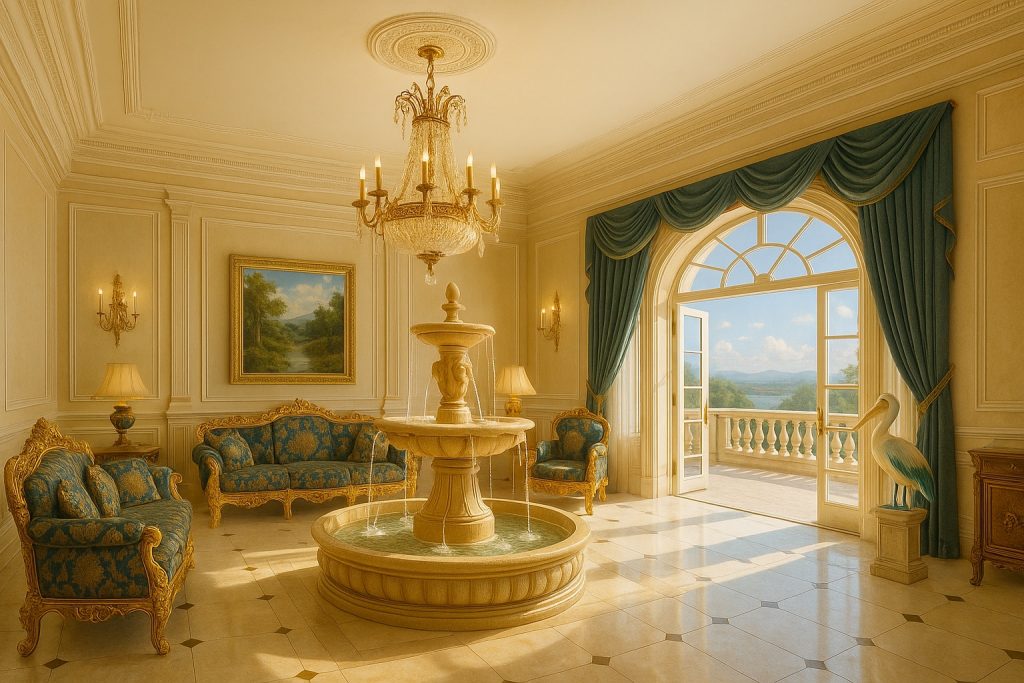
“No wonder you didn’t want to come home,” she said. She walked to the bed, shed her shoes and climbed in. “I could get used to this. When is it paid until?”
Deek followed her and sat on the edge of the bed. “I did so want to come home,” he insisted. “Anyway, it’s paid for another three days.”
“Does it come with free breakfast?”
“Yes. I usually ate in the room. Sometimes they’d set it up on the balcony for me.”
“Really? What would they bring you?”
Feeling increasingly uncomfortable, Deek answered. “Whatever I wanted. Omelets, smoked salmon, avocado, cheese, espresso, fruit. Once they got to know my tastes they started bringing me shakshuka, fresh mango, berries, Turkish coffee.”
Rania sat up in the bed. “No donuts?”
Deek winced, understanding the barb: you enjoyed all this, while I was at home alone and in pain. He shifted nervously. “I don’t eat that stuff anymore. I’ve changed a lot of things.” Forgive me, he meant to say, but let it lie.
“How about if we stay here a few days?”
“But honey,” Deek pleaded. “I’m tired of this place. Lately it feels like a prison. I want to go home.”
Sanaya had already begun packing Deek’s clothing into the two large suitcases they’d brought with them, while Amira sat on the edge of the fountain, letting the water splash off her hand.
“Mom,” Sanaya said, “Why don’t you go soak in the jacuzzi for a while? There are robes in the bathroom. Amira and I will pack, and when we’re done we’ll order room service for lunch.”
“There’s a jacuzzi?” Rania brightened at that and slipped off into the bathroom. Sanaya gave Deek a wink. “Mom deserves a little pampering,” she said. “You don’t have to give her the moon and the stars. Just a little luxury for a day.”
Deek chuckled. When had his daughter become so wise?
The Saghir Building
Just north of a small shopping center near the river, Deek pulled into a parking lot and parked in front of a six story white office building with mirrored windows.
“Where are we?” Rania asked.

The Saghir Building
Deek only smiled. “Come.” Exiting the car, they walked forward into a wide open-air plaza, a welcoming forecourt paved in pale stone and framed by neat rows of olive trees and tall ornamental grasses. A low burbling fountain provided a soft, rhythmic backdrop. The air smelled faintly of rosemary, as someone had planted herbs along the walkway.
Off to one side stood a metal bench, and beside it a large bronze sculpture of several children clustered around an open book, their faces intent, their postures relaxed and natural. The details were exquisite—the folds of clothing, the smooth curve of a child’s cheek, the sense of motion captured in stillness.
Rania pointed at the sculpture. “That’s a Clement Renzi! He was a Fresno sculptor. I’ve seen a few of his pieces at Fresno State and in the Tower District.” She walked her fingers lightly along the edge of a bronze sleeve. “This is a nice space. Whoever owns this building has good taste.”
Sanaya spun in a slow circle, taking it all in.
Amira hopped up onto the low fountain wall and stuck her hand in the water. “Why are we here, Baba? Are we meeting someone?”
Rania turned back toward Deek, smiling but puzzled. “Yes. What is this?”
Deek pointed behind her.
Mounted on a column of black marble, just a few steps from where she stood, was a brushed-steel plaque.
Rania read it aloud:
THE SAGHIR BUILDING
Offices & Executive Suites
She blinked. Then frowned at the plaque. Then at Deek.
“I don’t get it,” she said. “Why is our name on here?”
Sanaya’s mouth fell open. “No, Baba, really?”
“Really what?” Rania demanded.
“This is legit, Baba,” Amira said.
Rania looked back at Deek. “Did someone dedicate it? Is this a coincidence?”
Deek shook his head softly. “No, honey. We own it.”
Rania’s mouth opened slightly. “We what?”
A Different Reality
“I bought it,” Deek said gently. “Well, technically the family office did. One floor is ours. The other floors are leased to tenants.”
Rania stared at him as if the words were rearranging themselves in the air and refusing to land.
“You bought… a building.” Her voice was faint. “A six-story building.”
“Uh-huh.”
Color drained from her face, not in fear, but in overwhelmed disbelief.
She sank onto the bench, one hand pressed lightly to her cheek. “La hawla wa la quwwata illa billah… I need a moment.”
The girls exchanged a look – half amused, half concerned – and flanked her on the bench.
Rania let out a long breath. “Habibi… I thought you meant an office. A suite. Maybe some desks. She gestured helplessly at the smooth white facade, the mirrored windows, the plaza blooming around them. “Not this.”
Deek sat beside her. “I should have told you earlier. I know that. But I didn’t want to tell you while we were fighting. And then… everything happened at the river.”
Rania covered his hand with both of hers. “Deek… this is enormous.”
Deek made a half apologetic face. “Not really. Commercial real estate is in a slump right now. I got it for only three million. That’s a drop in the bucket.”
“Three million dollars is a drop in the bucket?”
“I get that you’re having trouble adjusting. But I need you to try. Our reality is very different now. This is part of what we need to talk about. There are decisions that need to be made. Anyway, let’s go upstairs.”
She studied his face for a long moment—and finally nodded. “Okay. I’m ready. Show me.”
The girls stood, grinning, and the four of them stepped inside. The lobby smelled faintly of eucalyptus and fresh paint, and the noonday sun sliced in through the wide front windows, reflecting off cream-colored marble tiles. A small waterfall bubbled along one wall, and a receptionist sat behind a sleek walnut desk.
She stood as they approached. “Good morning, Mr. Saghir.” She offered a radiant, professional smile. “Welcome back.”
Rania blinked. “She knows you?”
“We met recently,” the receptionist explained.
“What button do we press?” Amira asked in the elevator.
“Four,” Deek said.
Sanaya frowned. “You’re the owner, you don’t get the top floor?”
“This building had existing renters. Architecture firm on one, medical billing on two, call center on three, law offices on five and six. Four was available so that’s what I took.”
“Wow.” Amira pressed the glowing four with ceremonial reverence. “Baba, you’re like—an actual big shot.”
Deek laughed, embarrassed. “I only have what Allah gave me. It doesn’t make me a big shot. It’s an obligation. It’s important that we understand that.”
Family Office
The elevator chimed, and the doors opened onto a hallway lined with framed black-and-white cityscape photographs. A frosted glass door stood ahead, the lettering elegant and understated:
Saghir Family Office
Private Investments & Philanthropy
Rania put a hand on her hip. “You started a family office without telling your family?”
Deek grimaced, embarrassed. “It evolved very quickly. Even I have only been here twice.”
Inside, the reception area was bright, modern, every design choice intentional. A long teal sofa hugged one wall, beneath a painting of the San Joaquin River at sunset. A coffee table held a bowl of fruit and a wrapped tray with a selection of baklawa.
A mid-twenties African-American woman in a beige hijab stood from her workstation. “Alhamdulillah, you’re well, Mr. Saghir!” Her smile was genuine and warm. “We’ve all been making dua for you. Hi Sanaya, Amira.”
“Naeema?” Sanaya laughed. “You work for my dad now?”
“She’s our administrative coordinator,” Deek said. “She keeps the office from collapsing into chaos, or so I’m told.”
Naeema beamed.
“This is my wife, Rania,” Deek said.
Naeema shook hands graciously. “We’ve met, I don’t know if you remember.” She lowered her voice to a conspiratorial whisper. “If you have time, try the cafeteria downstairs. Your husband switched the menu over to halal Mediterranean food. Everyone loves it, even the other tenants.”
Rania raised an eyebrow at Deek. “Mm-hmm. That’s nice.”
From another office, a young man stepped out—tall, with wire-rim glasses and a short beard. Crisp blue shirt, sleeves rolled up.
“This is Zakariyya Abdul-Ghani,” Deek said. “Our CFO.”
“And admirer of your husband’s ability to perform ten impossible tasks at once,” Zakariyya said with a polite nod. “Sister Rania, it’s wonderful to meet you. The girls too. Deek, we have a few additions to the staff. Do you want to meet them?”
“Not right now. Where’s Marcela?”
“Out scouting. Plus, city inspection on the church property. She said she’ll text with updates.”
Deek nodded, then turned to the family. “Marcela is the real estate director. She wants to buy a lot more commercial property, while prices are low. Anyway, come, I want to show you something.”
Those Whose Hearts Tremble
He led them down a short hallway to another door with frosted glass. The sign read:
Executive Suite — Private
He opened it.
The room was larger than their living room at home, with floor-to-ceiling windows overlooking the slow bend of the San Joaquin River. Sunlight danced across the water and flashed across the polished hardwood floors.
A massive U-shaped desk dominated the center. A second seating area with a plush sofa and armchairs occupied one corner. Bookshelves lined a wall, still mostly empty except for a Qur’an on a stand, a model of a dhow ship, a sculpture of a lion mid-stride, and one of Sanaya’s kindergarten paintings, framed and labeled “Baba #1.”
Rania covered her mouth with her hand.
Amira ran straight to the window. “Baba! You can see the river. Like, the exact part where-” She stopped herself, glancing back at him.
“It’s okay,” Deek said gently. “It’s good to see it from a different angle.”
Rania walked a slow, reverent circle around the office.
“It’s not finished,” Deek said quickly. “Some art still needs hanging. And I want something representing Iraq, and -”
Rania cut him off with a sharp wave. “It’s astonishing.” Yet when she looked at him, her face registered something other than pleasure. “Makes the home office I’m building for you look quaint.”
Deek went to her, took her hand. “No, honey, you’re wrong. The home office is a thousand times more precious to me than all of this. I’ll drop by this office frequently, but I’ll work from the home office.”
“You don’t have to do that, Deek. This is obviously where you belong.”
Deek sighed. “Let’s go to the conference room.”
The conference room was glass-walled and sunlit, with a long walnut table, eight modern chairs, and a Quranic selection – ayahs 2 and 3 of Surat Al-Anfal – framed on the far wall:
“The believers are only those whose hearts tremble at the remembrance of Allah, whose faith increases when His revelations are recited to them, and who put their trust in their Lord. Those who establish prayer and donate from what We have provided for them.”
Quiet Apprehension
They took their seats, the four of them clustered near one end of the long table. Deek pressed a small console button.
A soft chime sounded. “Yes, Mr. Saghir?” Naeema’s voice came through a ceiling speaker.
“Naeema, could we have coffee, water, and a plate of muffins? Whatever’s fresh.”
“Of course. Be there in two minutes.”
Amira slouched comfortably in the chair. “Wow. You can just… call people and ask for muffins.”
Rania gave her a pointed look. “Your father has always been able to ask for muffins. He just never did.”
Deek didn’t even know what that meant, but he let it pass. He looked around at his family. Their faces – all three – showed a quiet apprehension. They felt the seriousness of the moment.
Deek folded his hands on the table. “I don’t think you all grasp how much money we really have. And yes it’s we, not me. Whatever Allah has blessed me with belongs to this family, and to your future children, girls, and their children after them.”
“Okay…” Sanaya tapped on the table with a fingernail. “How much do we have? Millions, right?”
Deek chuckled nervously. “Some of the investments I made just recently have done well. Our net worth now stands at about six hundred million dollars.”
Rania simply sat, wide-eyed. Sanaya whistled. Amira put her hands together, threw them out suddenly and made the sound of an explosion. “Sound – of – mind – blowing,” she said.
Sanaya nodded slowly. “It’s pretty wild.”
“Say alhamdulillah,” Deek reminded them.
“Alhamdulillahi rabbil aalameen,” Rania whispered.
“I wanted to bring you here,” Deek said, “because our lives are changing. And before they change any further, I want us to decide together what that future looks like.”
The girls exchanged a quick look. Rania stared at him steadily.
“Baba,” Sanaya said carefully, “what does that mean?”
Deek gave her a warm, reassuring smile. “It means that everything you’ve worked for still matters. Nothing you’ve done is wasted. Sanaya, you’ve studied hard in pharmacy. You are brilliant. And if you truly want to continue and become a pharmacist, I will support you fully.”
She nodded, though uncertainty flickered in her eyes.
“But,” Deek continued gently, “I want you to know that our reality is different now. You don’t have to work in a pharmacy for the rest of your life. You could own a chain of them. You could build something far bigger than what pharmacy school prepares you for.”
Sanaya looked stunned – not flattered, not dismissive – just stunned.
Amira frowned thoughtfully. “Does that mean… I shouldn’t go into event organizing anymore?”
“No,” Deek said, turning to her. “It means you don’t have to settle for being someone people hire to run their parties. You could own an entire venue. A banquet hall, a wedding garden, a conference center – whatever you dream.”
Amira’s eyes widened. “Own a venue?” She sat straighter. “Actually… that sounds kind of amazing.”
Rania touched Amira’s hand, smiling. “We’ll help you think it through.”
Deek took a breath. “And your mother… I know she’s taken leave from the hospital. And I know she’s exhausted.”
Rania’s eyes softened, but she said nothing.
“I thought,” Deek continued, “she might want to take on something meaningful, something that uses her compassion, her insight, her organizational strength. The family office needs a philanthropic director. Someone to oversee our charitable work, guide big decisions, partner with masajid and relief groups… someone with a heart like hers.”
Rania stared at him for a moment, then looked down, overwhelmed.
“And Sanaya,” Deek added, “you could intern under her. Learn the ropes. Run projects. Continue school if you want, or explore other paths. You’re at the right age to shape something new. I’m not telling you what to do. These are options.”
Sanaya swallowed hard. “This is… a lot.”
“It is,” Deek agreed. “But that’s why I wanted us here. I don’t want what happens next to feel like something happening to you. I want it to be something we build together.”
The New House
“Last thing,” Deek said. We need to talk about the new house.”
“I haven’t even seen it,” Rania stated flatly. “As usual.”
“It’s unfinished. But it’s 50 acres of prime land, with a view of the river. I paid a good chunk of money for it. But I don’t want to move there. The girls say it’s spooky and too far away, and I’m happy in our current house.”
“Fifty acres,” Rania mused, elbows on the table. “I’ve been enjoying the process of building the home office. Learning about the codes, dealing with the architect, all of that. What if I were to finish that house, then we sell it? Could you finance that?”
“Would you really want to take that on?”
“I think it would be fun.”
“Then knock yourself out. Build a mansion, pool, jacuzzi, tennis court, horse stables… Whatever you can dream of. But consult with Marcela, she’ll tell you what features are popular with buyers.”
Rania sat back, smiling.
Stay Grounded

Muffin and latte art
A soft knock came, and Naeema entered with a tray—coffee, tea, water, and a basket of warm muffins. She set them down, smiled, and slipped out. Rania snatched up a muffin and bit into it without hesitation, and the girls followed suit. Still munching, Rania poured coffee for the four of them, her hands steadier now.
“Yummy and hot,” Amira commented.
“And there’s one more thing,” Deek said. “We have properties in San Francisco that need oversight. Someone has to visit occasionally. Check the books, monitor development. Whoever does that will have a driver – I have someone in mind, an amazing driver and bodyguard. I’m just mentioning this because Sanaya, I know you don’t like to drive on the highway, and Amira you don’t have a license yet. To cut to the chase… Long-term, one of you will be running the family business. I’m not choosing who. I want you to grow into it at your own pace.”
The girls looked at each other again—this time not with confusion, but dawning awareness.
“However,” Deek added firmly, “none of this means becoming one of those spoiled rich families who winter in the Caribbean and summer in Europe, and whose hardest decision is which designer outfit to wear.”
Rania raised an eyebrow, deadpan. “Yes. Wouldn’t that be terrible.”
The girls laughed.
Deek squeezed her hand under the table. “I’m serious. We live normally. We stay grounded. We serve Allah. We help people. We stay humble. I’m telling you. My stay at the Venetian didn’t make me happier. I’ve seen what the other side is like – rich and lonely. It’s not pretty.”
Rania leaned back in her chair, her expression softening into something proud and resolute.
Amira reached for another muffin. “So, Baba… what you’re saying is…”
“Yes?”
“We’re leveling up. Like in a video game.”
Deek laughed. “Yes, habibti. But we’ll do it one step at a time. You know what happens when you level up?”
“It gets harder,” Amira said solemnly.
“Right. And stop eating muffins, already.”
Sanaya reached across the table and put a hand on his. Rania laid hers atop Sanaya’s, and Amira slapped hers on top, making her mother grimace.
For the first time since the river, Deek felt wholly, completely steady. The future was no longer something to fear. It was something they would walk into together.
Bengal Beanz
That evening, Deek texted Faraz.
Can you meet for coffee? I’ll pick you up.
Faraz replied immediately: Of course, akhi. I am ready.
When Deek pulled up, Faraz climbed into the passenger seat, brushing bits of rice off his shirt and adjusting his crown-style kufi.
“Where we going?” he asked.
“You’ll see.”
When they pulled into the parking lot of a newly renovated café called Bengal Beanz, Faraz leaned forward, studying the freshly painted sign depicting a Bengali tiger wearing round spectacles, reading a book while sipping a steaming mug of coffee.
Faraz grinned. “Ahh, Bengali pride! This used to be Fresno Roast, akhi. I guess they go out of business. But look! Bengali tiger and book. Now this is respectable coffee shop.” He chuckled, pleased.
Inside, they found themselves at the tail end of a long line, but the assistant manager behind the counter – a short, thin blonde woman who looked like she ran marathons – spotted them and waved. “Evening, Mr. Saghir!”
Faraz raised his eyebrows. “The barista know you? You coming here a lot?” He looked around. The place was packed, nearly all the tables occupied, mostly with young hipsters and college students, some working busily on their laptops.
Studying the menu, Faraz winced. “Seven dollar for coffee? Astaghfirullah. How a college student pay that? When I am in college I live on rice and dried lentils that I pick up from the street.”
Deek gave his friend a skeptical look. He very much doubted that Faraz had collected lentils from the street. He seemed to remember that Faraz’s father was an official in the Bangladeshi foreign ministry.
“Don’t worry,” Deek said. “I invited you, remember? It’s my treat.”
“Even so… We could have free coffee in the masjid kitchen, like old days. You remember After Isha we sit and talk crypto for hours, and eat those French cookies you like.” Then, embarrassed, he cleared his throat. “I mean, I forget you are… you know.” He waved vaguely. “Rich now. But still. Wasting money is wasting money.”
Deek smiled. “You should be glad so many people are willing to pay seven dollars for a coffee.”
“Why you say that?”
“It’s money in your pocket.”
“What pocket we talking?”
Instead of answering, Deek pointed to an item on the menu. A stylized tiger paw print labeled a specialty blend:
Bandarban Arabica — Bright, Floral, Single-Origin
Faraz leaned in, incredulous. “Bandarban? Is a district in Bangladesh! How they get beans from my homeland all the way here?” He slapped the counter. “Okay, I take that one! With hazelnut syrup.”
Deek ordered a Turkish latte for himself.
They took their drinks to a small corner table. Steam curled upward; the shop hummed with quiet conversation and soft instrumental music.
Rough Time
“So,” Deek said, blowing over his cup, “how are you doing, akhi?”
Faraz sipped his coffee. “Unbelievable! Is real Bangladeshi coffee. Is like I am home again. Really blowing to my mind.”
“I asked how you are doing.”
Faraz waved a hand. “Fine, fine.”
“No.” Deek touched his friend’s arm. “I really want to know.”
Faraz hesitated, cleared his throat. “Rough time. I lose all my savings in crypto. Not only crypto but bank savings. We sell one of the cars. I have to convince my wife to move to one bedroom apartment. With three kids, imagine? But rent is killing us. Masjid Madinah don’t pay that much, you know. I been doing handyman jobs… whatever comes. Alhamdulillah for everything, but…” His voice cracked. “Is been hard.”
Deek frowned. “Have you actually moved yet?”
“No. Looking for cheap place.”
Deek nodded. “You should hold off on that.”
“Hold what?”
“I mean, don’t move.”
“Why? We can’t afford -”
“Come with me.”
They went through a door marked Employees Only as the barista gave Deek a knowing smile. Walking down a short corridor, they stepped into the small manager’s office.
Partners
Faraz stopped dead.
Two framed photographs hung on the wall, side by side. One showed Deek, smiling and holding a steaming mug beneath the Bengal Beanz sign. The other was a photo of Faraz, taken at a masjid barbeque, laughing with a half-burnt skewer in hand. Each photo had a plaque beneath it.
DEEK SAGHIR — Partner
FARAZ AHMED — Managing Partner
Faraz stared. His lips parted. His throat bobbed. “Akhi,” he whispered. “What… what is this?”
Deek placed a hand on his shoulder. “This shop is yours and mine. I invested, but you run the place and we split the profits. My people have looked over the books. This place is a money machine. You can pay yourself a salary of one hundred K per year to start. Honestly, when you’re ready we could open a second location and double your salary.”
Faraz only stared. “One hundred what? Dollars? Per day?”
“No, my friend,” Deek said gently. “One hundred thousand dollars per year. I’m trying to tell you, this place is yours. We’re co-owners. Both of our names are on the deed.”
Faraz covered his face with both hands as tears came. Soft at first, then shaking. Deek stepped forward and pulled him into a hug.
“You deserve this, brother,” Deek said. “You dedicated your life to caring for the masjid and the people there. Now it’s your turn.”
When Faraz finally calmed, Deek guided him gently into the manager’s chair.
“Try it,” Deek said softly. “Get comfortable.”
Faraz obeyed hesitantly, like someone touching a dream that might evaporate. He sank into the chair, palms flat on the desk, staring around the small office.
“When you’re ready,” Deek told him, “the assistant manager will teach you everything—inventory, payroll, scheduling, espresso machines. You’ll pick it up fast.”
Faraz nodded, unable to speak. Deek let himself out quietly, closing the door behind him.
Lift As You Climb
Walking back through the plaza, Deek felt a lump grow in his own throat. It hit him suddenly, sharply, like a slap to the chest: If not for the insane, impossible moonshot of the New York Killa coin—if not for that miracle that set everything else in motion – he would have been where Faraz was now. Overworked, broke and ashamed. Still sitting in that stifling closet, the little fan trying to keep him cool, eating too much junk food and losing money. Fighting with Rania, losing the respect of his family.
Allah had saved him from all of that. SubhanAllah, alhamdulillah. He had no illusions about that. Of course he had worked very, very hard, but nothing happens without the help and will of Allah. He never could have imagined the life he had now.
Faraz had been his partner in a way. The two of them had hung out almost every night, sharing strategies and knowledge. So what kind of man would Deek be if he didn’t share his good fortune with his partner?

November Evans
What had the driver said? November Evans, the fierce little bodyguard who took down a whole squad of North Korean soldiers single-handed. “Lift as you climb. As you progress in life, as you climb the ladder, you bring your people with you. You don’t leave them behind. You lift them up along with you.”
This was why Allah had saved him, and he must never forget it. He whispered under his breath as he stepped into the cooling Fresno night. “Ya Allah, let me be worthy.”
Lost Lake
One week later, Lost Lake Park was alive with people and food and laughter. The air smelled of pine sap and grilling meat. Two halal food trucks and a dessert truck were parked side by side beneath the trees, their windows open, their griddles hissing. A sign on each read, “Free food while it lasts.”
In addition, nearly everyone had brought food, and a wide variety of Arab, American and Pakistani food was laid out on two picnic tables, along with a multitude of desserts.
A handmade banner strung between two trunks read:
WELCOME, FRIENDS & FAMILY
Potluck Picnic – Lost Lake
Amira had chosen the font and colors herself, and it showed; even the little doodled stars around the edges looked professional.
There were about forty people in all. When Deek and his family first arrived, he walked to the edge of the river and gazed out, spotting the overhanging tree branch he’d strapped himself to, until he slipped and fell beneath the water. And there, just downstream, where the river was as wide as an anaconda’s mouth, and as dark as a desperate man’s thoughts, was where Rania must have found him, drowning and essentially dead, not knowing who he was, or at which point in time he existed.
It was astounding that she’d found him underwater in a pitch-black river on a dark night. It was not coincidence or luck. Deek no longer believed in such things. It was Divine providence. It was Allah saying, “Go back to the living for now. I have things in mind for you.”
The ground still bore the tracks of emergency vehicles. He jerked in surprise as someone touched his shoulder, but it was Rania.
“That was a moment,” she said, “that has passed, and will not return. Everything that happens is a barakah if it teaches you something. Turn around.” She grasped his shoulders and turned him to face the lively picnic. “All these people are here because they care about you. They’re not here for the free food. They would have come without that. They’re here for you.”
Deek nodded, shaking off the ghosts of yesterday, and of the more distant past. He gave his wife a hug, then pulled back. “Your back still doesn’t hurt?”
Rania shook her head. “Not a twinge. I can’t explain it.”
“Alhamdulillah. Let’s not look a gift back in the spine.”
Rania laughed. “That doesn’t even make sense.” She took his hand. “Come on, let’s talk to your guests.”
They moved from group to group hugging people, trading jokes, accepting duas and well-wishes. Every plate of food, every smile, felt like a small, shining proof that he was still alive.
Walk With Me
Lubna and her husband sat on a blanket, hats pulled over their eyes, napping. Their kids were under a pop-up canopy with Zaid Karim, Safaa, Hajar and Anna, the gaggle of kids playing and occasionally running to the food trucks, while Zaid and Safaa talked quietly and stuffed themselves with heaping plates of food.
Marco held court at a picnic table with Naeema, Marcela, Zakariyya, and a few of the other family office staff, arguing cheerfully about how monetary policy would affect the price of gold, and whether BRICS would displace the dollar in international trade. Tariq and his wife were sitting with Imam Saleh, probably talking about the Seerah of the Prophet (s), or the lives of the Sahabah. A group of Rania’s nursing friends chatted in the shade, and Rania stayed to talk to them while Deek moved on.
Faraz’s wife Saadiyah and their three kids sat at one of the picnic tables eating, but Faraz was not there. He was at Bengal Beanz, no doubt. He was taking the job very seriously, putting in a lot of work. Saadiyah had already come to Deek’s house once, bringing multiple platters of food, sobbing and thanking him. It had been extremely awkward. He waved, but gave them a wide berth and walked on.
A knot of teenage girls—Sanaya’s and Amira’s friends—hovered around the drinks cooler, laughing at something on a phone. Deek waved to them and walked on.
He spotted Zaid. He’d left his group and was wandering around, scanning the area, looking more like a security guard than a guest. Deek caught up with him.
“Come walk with me a bit,” Deek said quietly.
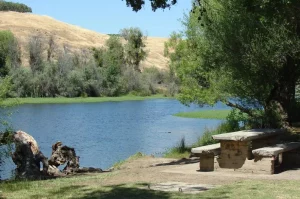
Lost Lake Park, Fresno
They strolled around the perimeter of the picnic. There was a Hispanic family sitting at a nearby picnic table: a young couple, an older white-haired woman with a cane, and three kids lying on a nearby blanket, looking bored. Deek noticed the envious glances they cast toward the larger group. He approached them.
“Hi guys, how’s it going?”
“Hey, good, wassup?” the father said. He was muscular, with thick black hair and a white brimmed hat, and dressed in what Deek sometimes thought of as a Chicano outfit – baggy shorts, white t-shirt under an oversized flannel shirt, white knee-high socks and white sneakers.
“My name’s Deek.” He gestured. “That’s my party.”
“Is it your birthday?” the young mother asked.
“I almost drowned in the river right there.” He pointed. “My wife saved me. I guess I’m celebrating being alive.”
The Hispanic family made surprised sounds. “Our lady of angels, Mary, mother of Jesus, saved you,” the grandma said.
Deek smiled, not wanting to debate the issue. “Anyway, the food trucks are free. No cost at all. Why don’t you go over and get something? If anyone asks, tell them Deek said it’s okay.”
“Dude, that’s what’s up,” the father said. “God bless you, man.” The kids dashed toward the food trucks while the mother helped the grandma onto her feet. Deek and Zaid walked on.
“Zaid,” Deek said. “I haven’t forgotten what you did. You risked your life for me. You’ve been there for me in a lot of ways, and you never asked for anything.”
“Actually,” Zaid said, grinning. “I asked for my daily fee plus expenses. You gave me a whole lot more.”
“I gave you nothing,” Deek said firmly. “Nothing like you deserved. If you ever need anything at all, you call me. I mean that.”
Zaid smiled, the lines at the corners of his eyes deepening. “It’s the other way around, big man. You’re carrying a boulder now. If you need anything, you call me. Day or night.” He tapped Deek’s chest. “That’s what family is for.”
Moved, Deek pulled his savior and friend into a hug.
Shoulder to Shoulder
From the middle of the meadow where the picnic was going on, a clear voice rose, calling the adhaan for Dhuhr, the sound threading through the trees. Conversations faded. Some of the teenagers fell quiet mid-laugh. Deek and Zaid hurried to join. Imam Saleh stepped forward to lead salat on a flat patch of grass the youth had cleared. Men and women lined up. Picnic blankets became ad-hoc prayer rugs.
Deek found himself shoulder to shoulder with Marco in the first row.
“Allahu akbar,” Imam Saleh called, and the jama’ah followed suit.
Deek raised his hands and felt the familiar settling that came with the opening takbir. Beside him, Marco did the same. When they bowed together in ruku, Deek’s eyes stung unexpectedly. How many times had he and Marco sat in dingy apartments or greasy spoons, arguing about God, meaning, randomness, the cruelty of the world? And now here they stood, shoulder to shoulder, foreheads touching the same patch of earth for the sake of the same Lord.
When Deek recited, “Alhamdulillahi rabbil-aalameen,” the words hit hard. There was so much to be grateful for.
After the salat, the lines dissolved. Kids sprinted away, and young men began organizing teams for a soccer game. Someone produced a ball, and someone else laid out makeshift goals using folding chairs.
Still Got It
“Deek!” Tariq called. “You’re on my team!”
Deek laughed and joined in. At first he jogged cautiously, worried that his lungs or legs might give out. But as the game went on, he found himself cutting, feinting, even managing a decent sprint as he drove the ball before him, finally passing it to Zakariyyah, who shot a clean goal.
The youth cheered as Deek and Zakariyya jogged away with arms raised, Deek nearly tripping over a tree root but staying upright.
“Still got it, Baba!” Sanaya called.
“Barely,” he panted, grinning.
After twenty minutes his chest burned pleasantly and sweat cooled on the back of his neck. He waved himself off the field, wandered to the edge of the clearing and sank down with his back against a broad oak. The bark pressed solidly between his shoulder blades. Above, leaves whispered in soft conversation. The scents of grilled meat and fried onions drifted over on the breeze. In the distance he saw Imam Saleh sitting with the Hispanic family, eating and chatting.
He closed his eyes, just for a moment.
Dream Visitors
He was still under the tree when he opened them again. The light had changed. The sky above was deeper, an almost-indigo blue, and the edges of the world felt too sharp, too crisp. The children’s shouts had faded to a distant hum.
Someone sat down on his right.
He turned and saw a small, thin woman in a plain wool garment, her face lined but luminous, eyes dark and unwavering. It was his ancestor and conscience, Rabiah Al-Adawiyyah, the great saint and ascetic. On his left, in a beach chair, Queen Latifah lounged in a sweatsuit and sneakers, one leg crossed over the other, a glass of cold apple juice in her hand.
Deek huffed a laugh. “Long time no see.”
Queen Latifah tilted her head. “You’ve been busy, baby.”
On his right, Rabiah watched him with a gaze that seemed to look straight through his skin and bones. She spoke softly, her voice carrying like the river. “Kullu man alayha fan, wa yabqa wajhu rabbika dhul -jalali wal-ikram.”
He knew these ayahs from Surat Ar-Rahman: “Every being on earth is bound to perish. Only your Lord, full of Majesty and Honor, will remain.”
Rabiah said nothing else. She didn’t need to. Her silence weighed more than any lecture. In her eyes he saw a white, six-story building crumbling, phones going dark, bank accounts erased like chalk in the rain. He saw graves closing over the richest and the poorest alike. He saw the river, black and cold, and the moment when nothing mattered except the state of a man’s heart with his Lord.
Queen Latifah gave a low chuckle. “Sister Rabiah be hittin’ you with the heavy truth,” she said. “But she’s right. All that paper?” She flicked her fingers, scattering imaginary bills. “What sticks is love and charity.”
She leaned back against the tree, took a slow sip of her juice, and added, “It don’t mean you can’t enjoy a little mac n’ cheese. We’ll always be here for you, dog.”
Deek blinked, and woke.
A thin line of drool dampened his cheek. The football game raged on in front of him, the shouts of youth rolling across the field. He pushed himself upright, stretching his back. After a moment, he rose and scanned the clearing.
He found Tariq seated beneath a cottonwood tree near the water, earbuds in, gently rocking as he listened to Qur’an recitation on his phone and repeated the ayaat under his breath.
“Hey,” Deek said, approaching.
Tariq pulled out one earbud. “As-salamu alaykum, brother.”
“Wa alaykum as-salam.” Deek paused. “Did you bring any of that mac n’ cheese?”
Tariq grinned proudly. “You’re a man on a mission, aren’t you?”
Deek chuckled. Then his expression softened, thoughtful, as if considering the words more deeply. “I suppose I am.”
THE END
***
Author’s Note: I broke into tears when I wrote the words, “The End.” It’s not that I was sad. Just that I’ve been writing this book since April. I pour my heart into my work, I lose sleep, I dream about it, I think about it all the time. So that moment of culmination, when the project is realized, is emotional. I feel that Deek is on a good path from here. I don’t think he will be corrupted by his wealth, for he will always have his ancestor Rabiah Al-Adawiyyah in his dreams, reminding him of what matters. Even if he were to somehow lose all the money, I think he’d be okay. There won’t be a sequel to this book, but there will be more Zaid Karim novels inshaAllah, so we may well see how Deek’s life progresses through that lens. I hope you enjoyed this book. If anything in it benefited you, make dua’ for me and my family. I appreciate your loyalty as readers. You mean a lot to me. Jazakum Allah khayr.
Reader comments and constructive criticism are important to me, so please comment!
See the Story Index for Wael Abdelgawad’s other stories on this website.

Wael Abdelgawad’s novels – including Pieces of a Dream, The Repeaters and Zaid Karim Private Investigator – are available in ebook and print form on his author page at Amazon.com.
Related:
A Wish And A Cosmic Bird: A Play
Breakfast With The Khans [Act One] – A Play
The post Moonshot [Part 32] – FINAL CHAPTER: A Man On A Mission appeared first on MuslimMatters.org.







 Painting of Dulwich College by Camille Pissarro, 1871 (from
Painting of Dulwich College by Camille Pissarro, 1871 (from  by our side, we never stand alone. Let’s assure students that their community stands with them too.
by our side, we never stand alone. Let’s assure students that their community stands with them too.
